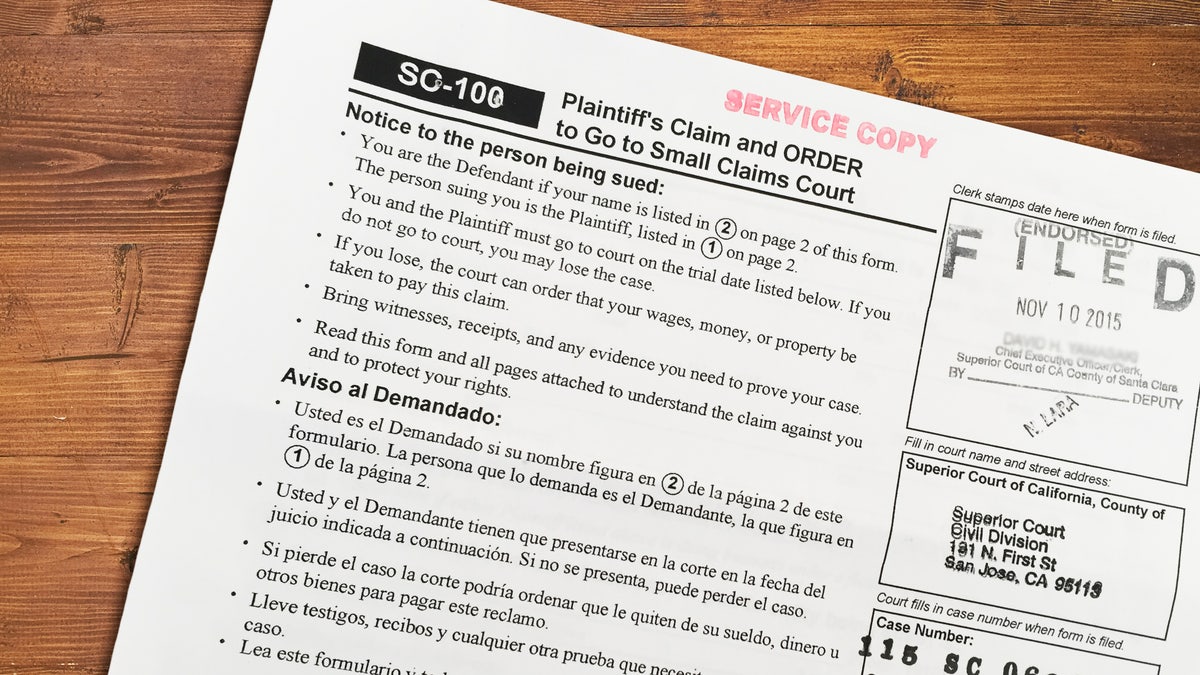
Small claims court document
You signed the lease with the best intentions, honest. But that was then. Now those nine months left on your lease feel impossibly long. You're not going to make it. You need to get up out of this place, like, yesterday.
But can you? Short of getting evicted, or fleeing in to the night only to live in fear of a lawsuit from your landlord, can you opt out of your unhappy renting situation?
Turns out, you can. Play your cards right, and your landlord might just agree to let you out of your lease without your ending up as a defendant on "Judge Judy."
Make a good case
Your landlord probably won't let you out of the lease because the kitchen is too small or you want to move in with your significant other. To get out on a personal note, you'll need a darn good reason.
"You generally need to have an event that is unexpected," says Jonathan G. Stein, a consumer lawyer in Elk Grove, CA.
That could mean a death in the family, sudden illness, military assignment, or an unexpected job relocation. But be up front about whatever's going on.
"Open and honest dialogue usually produces the best results, since the owner holds the cards, having a signed lease in place," says Trent Zachmann, chief operating officer of Renters Warehouse, a property management company.
And if you can prove the hardship in writing -- say, with a job relocation letter -- do so; it'll only help your case.
But what if I just hate it here?
If you're miserable because the rental has too many issues or repairs aren't being done in a timely fashion, your landlord might let you out of the lease, but you'll have to tread lightly.
"Even if there is a problem with the unit, do not blame the landlord or try to make the landlord feel like it is their fault," Stein says.
To pull that off, employ that old psychological trick of using "I" instead of "you" statements. It works! Instead of, "You're too cheap to pay for a licensed plumber and you messed up the kitchen sink," try saying, "I'm having a difficult time cooking in the kitchen because of ongoing problems with the kitchen sink."
Using a neutral tone when talking about problems in the rental will keep your landlord from feeling defensive.
Pro tip: If the landlord won't budge and the living conditions really aren't habitable, you might need to call in a lawyer or ask your local housing authority for help terminating the lease.
Get ready to pay up
So the landlord is willing to listen to your impassioned pleas for freedom. That's good news. The bad news? You'll still probably have to pay up to get out.
Some leases have clauses that clearly outline the process required to end a lease early. That clause should tell you how much you'll need to pay. If it isn't there, get ready to negotiate with your landlord. Odds are, they'll come up with a sum they want you to pay before they'll terminate the lease -- either a flat fee or a percentage of the remaining rent.
Your job: to decide whether it's worth it.
"For example, if you are terminating a 12-month lease at four months, and the landlord will take two months as a fee instead of eight months, it makes sense to pay it," Stein says.
Get it in writing -- all of it
We say this a lot here -- and for good reason -- whatever you and your landlord agree on, get it in writing. Paying an early termination fee? Ask for a bill and copy of the receipt. Did you promise to move midway through the month so your landlord has time to find another tenant? Get your landlord to put that in an email, at the very least. And don't forget the lease termination. Get a copy of the voided lease and a letter from your landlord explaining the mutual decision.
Anything you have in writing now could save you big later on if your landlord temporarily develops a case of amnesia.
Move out with care
It may come as a surprise, but you might be able to get your security deposit back, even if you're cutting ties early. Check your state laws and local guidelines to find out what your security deposit can be used to pay for (aside from damages) and whether your security deposit is forfeited in the event of an early termination.
When it comes time to move out, do what you can to leave the place in good condition. Take everything with you. Broom clean every room. Patch up holes from wall decor.
Have the landlord attend a final walkthrough -- if there's a question, you'll have a chance to hash it out now. For good measure, take photos of every room (and inside closets) just in case a dispute creeps up later.
Finally, don't forget to give your landlord your forwarding address (to be able to send you the security deposit) and don't lose track of those important documents in your move!